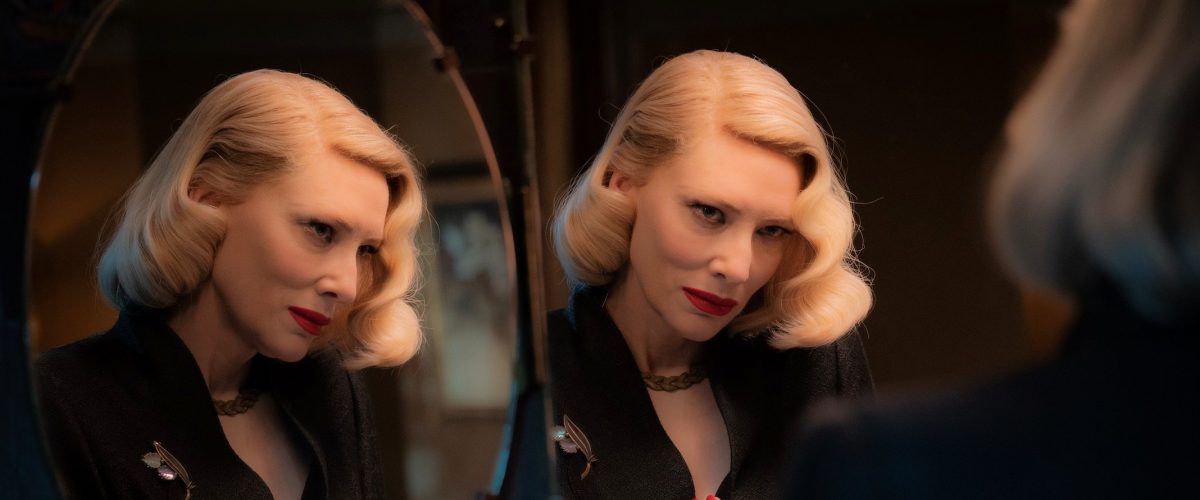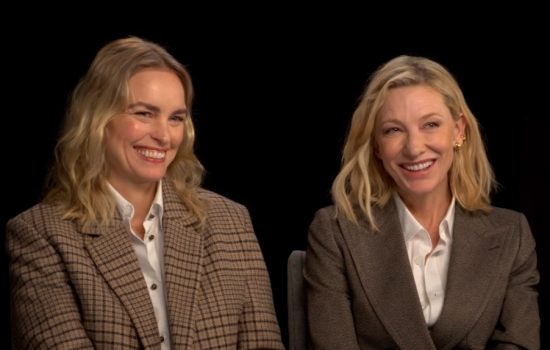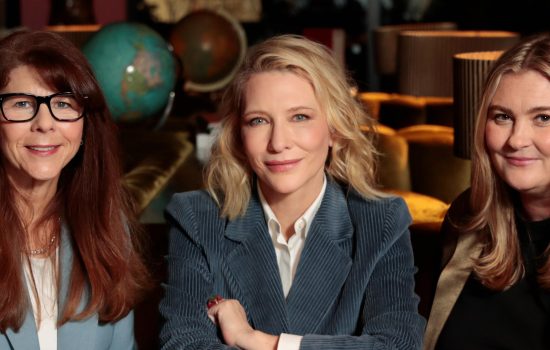Hi, everyone!
LA Times published an interview with Cate. Read below:
If you’re Cate Blanchett, with two Oscars to your name (“The Aviator,” “Blue Jasmine”) you can do pretty much whatever you want in Hollywood. Which makes it extra fascinating that the Australian actress with the tremendous cheekbones and searing, narrow gaze has chosen to play supporting roles in two films this year: Guillermo del Toro’s “Nightmare Alley,” a neo-noir indictment of capitalism set in the world of 1930s carnies and grifters, and Adam McKay’s “Don’t Look Up,” a warning about the climate crisis wrapped in the guise of a movie about an impending comet impact. The Envelope spoke with Blanchett via Zoom and learned that, for her, every film is an ensemble and there are no small roles.
How much of your decision to work on “Nightmare” and “Don’t Look Up” had to do with the role and how much was a chance to work with great directors?
What I gravitate toward has been people that you want to be in the room with, or the conversation that you want to be part of. Those two examples were absolutely 110% director-driven. I wanted to be part of the conversation in the room with those extraordinary people.
The casts on both films are ensembles, and it’s like a greatest hits of who’s terrific right now.
When you’re working with actors of that caliber — and they don’t necessarily have to be well-known actors — you read the script and you think, “I know what the scene is about” or “I know who that character is.” And then things come tumbling out of them, and suddenly the scene goes in a direction you could never have imagined.
What’s a good example of that?
I had no idea how the scenes in the office treatment room in “Nightmare Alley” were going to unfold. Bradley [Cooper] played Stan as such a powerfully empty individual. That was absolutely thrilling to play opposite. Then, on my first day on set of “Don’t Look Up,” I was in the Situation Room with all of those actors, and it was like being teleported to Mars. Like, how did I get to be in the room with all these people, playing such strange characters in such an impossible and ridiculous circumstance?
You could headline more films than you do; what’s the appeal, then, in being one among many in an ensemble picture?
“Hamlet” only works if you understand who Gertrude is, who Claudius is … all of those characters, you’ve got to create a court, and they’re all part of that dilemma. Every so often, you’ll see a great production of “Hamlet” where the Hamlet is amazing, but the rest of the characters haven’t been worked. I learned to observe that early on as an actor in the theater, that everything is an ensemble. You get typecast incredibly quickly, and I get so bored of myself I think, “I’ll play that little role and do that little thing.” I had a director say to me once, “You have to stop playing small roles.” And I went, “Why?” There’s often a sense that, as an actor, there’s a certain career path that’s desirable and … I don’t think that way.
Having played Queen Elizabeth I and then winning your first Oscar for playing Katharine Hepburn in “The Aviator,” did you find you were getting typecast into a particular stiff-upper-lip kind of character?
Queen Elizabeth couldn’t be more different to Hepburn, particularly when Hepburn is looked at through the lens of Martin Scorsese. But I felt I was able to escape that [typecasting]. In the end, this is the instrument you’re working with. There’s a lot of prosthetics and artificial augmentations that can be liberating for an actor, but there’s also rhythm and timing and tone, which you also have. For me, it’s about balancing the two tools.
Women in Hollywood over the age of 40 used to find good, meaty roles difficult to come by. You’re over 50 now, but these two roles are not just meaty, but focused on you as a sexual character. How much of that do you find personally edifying, and how much of it signals the way the industry has shifted?
The fact that you’re asking the question means it’s still obviously an issue. … Women have had enough of being polite and waiting for the change to happen, or assuming it’s going to happen at all. There’s a sense that women aren’t being polite about it anymore, they’re just claiming that space. People talk about the golden age of Hollywood and how women were written for and how compelling they were as actresses. We glorified this period of filmmaking, but we lost the skill set around supporting the longevity of those careers. I think that’s definitely changing.
 Welcome to Cate Blanchett Fan, your prime resource for all things Cate Blanchett. Here you'll find all the latest news, pictures and information. You may know the Academy Award Winner from movies such as Elizabeth, Blue Jasmine, Carol, The Aviator, Lord of The Rings, Thor: Ragnarok, among many others. We hope you enjoy your stay and have fun!
Welcome to Cate Blanchett Fan, your prime resource for all things Cate Blanchett. Here you'll find all the latest news, pictures and information. You may know the Academy Award Winner from movies such as Elizabeth, Blue Jasmine, Carol, The Aviator, Lord of The Rings, Thor: Ragnarok, among many others. We hope you enjoy your stay and have fun! 



 A Manual for Cleaning Women (202?)
A Manual for Cleaning Women (202?) The Seagull (2025)
The Seagull (2025) Bozo Over Roses (2025)
Bozo Over Roses (2025) Black Bag (2025)
Black Bag (2025)  Father Mother Brother Sister (2025)
Father Mother Brother Sister (2025)  Disclaimer (2024)
Disclaimer (2024)  Rumours (2024)
Rumours (2024)  Borderlands (2024)
Borderlands (2024)  The New Boy (2023)
The New Boy (2023) 











